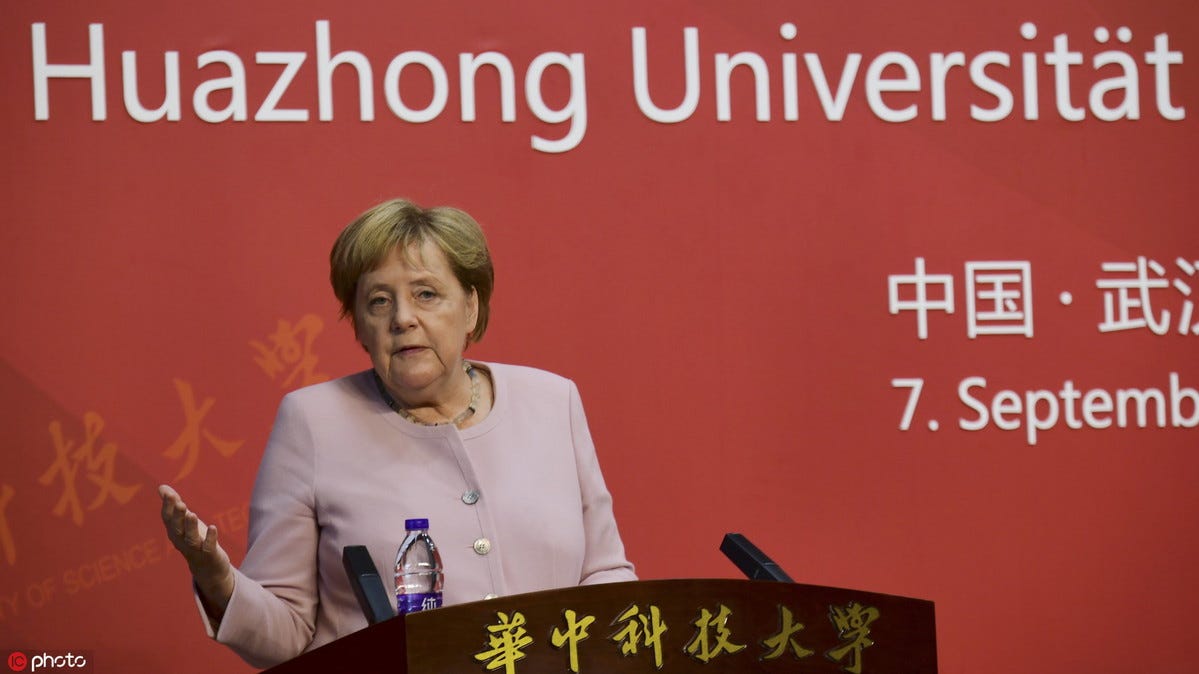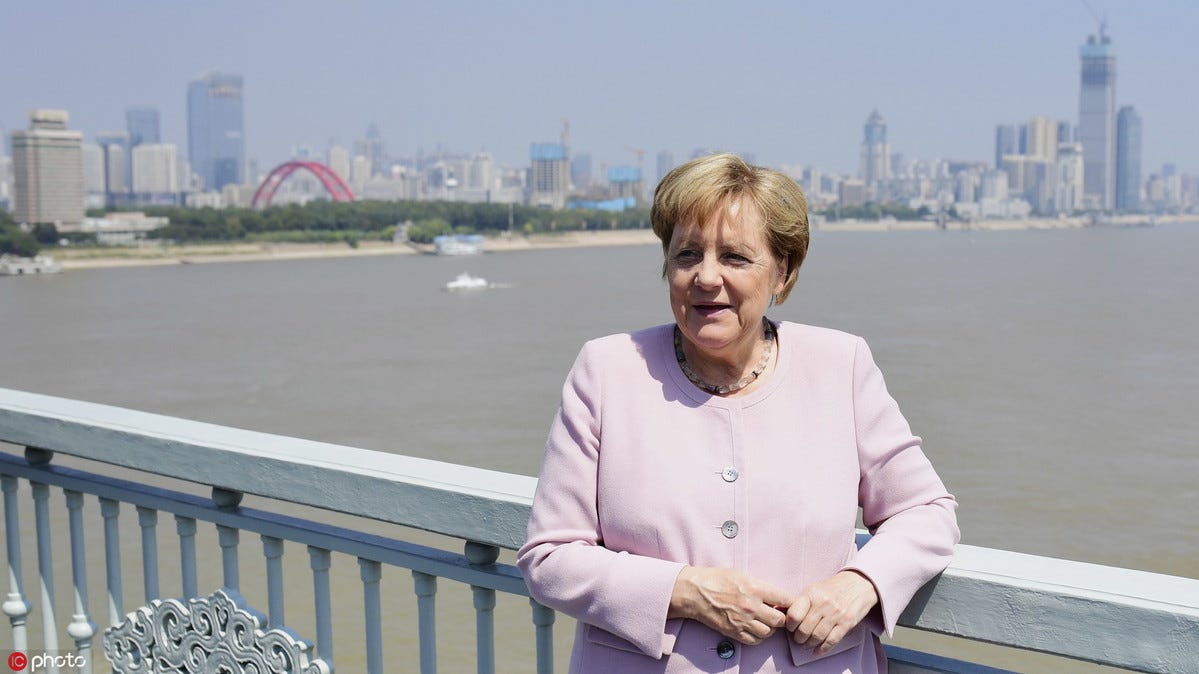Merkel's State Visit to Wuhan on 6–7 September 2019: A Retrospective
On 6 September 2019, just months before the first officially recognised Corona infections, Angela Merkel arrived in China for her twelfth state visit. She spent the first day in Beijing in meetings with state officials, before travelling on Saturday to a city in the interior named Wuhan.
As on prior visits, Merkel travelled with a substantial corporate delegation, whose members aimed to conclude deals and expand cooperation with Chinese firms. The German automotive supplier Webasto was at that moment opening a new production facility in Wuhan, and Merkel attended the ribbon-cutting ceremony:
Together with the city’s mayor, Xianwang Zhou, and the CEO of Webasto SE … Merkel gave the official go-ahead … for the production of roof systems, electric high-voltage heaters and charging solutions at what is now the group’s largest plant.
After the ceremonial opening, the Chancellor received a tour of the production facility, to gain insight into the German automotive supplier’s development and production processes, as well as its strategies for further development.
You might remember this company: The earliest official Corona cases in Germany were Webasto employees who brought the virus back to Bavaria from Wuhan in late January 2020.
Few press reports took notice of the Webasto visit. The Chinese Global Times emphasised Merkel’s tour of the Tongji Hospital isntead, an event that has also intensely interested commenters in our sphere. The facility is a nominal site of German cultural interest, for it was founded in 1907 by the German doctor Erich Paulun.
The highlight was a speech Merkel delivered later that evening at Huazhong University.
The entire text is online. It’s nothing but the usual pablum about globalisation, climate change, renewable energy, free trade, multilateralism and human rights. There are vague, polite hints of Western disapproval about the suppression of the Hong Kong protests.
For the do-gooders in the German press, this wasn’t enough. Magazines like Spiegel and Stern ran articles criticising the chancellor for not more full-throatedly defending democracy. Other news outlets indulged in a more general disapproval of Chinese conditions and government. The Süddeutsche Zeitung reported darkly that treatment decisions at Tongji hospital were based directly on the net worth of patients and disapproved of Chinese nationalism. Deutsche Welle, meanwhile, praised Merkel for taking China to task over its “climate record” and its social credit system:
The chancellor’s speech in Wuhan also included some criticism of China's social credit system, which allows the state to evaluate economic and social creditworthiness of both individuals and businesses using personal online data.
China’s social credit information system authority said that some 20 million of the country’s 1.3 billion people had been banned from air and train travel in 2018 because their credit scores were too low.
Merkel told the students that in Europe the system was viewed as a bad idea because data privacy was considered a human right.
Curiously, the official text of Merkel’s speech seems to contain not a single mention of social credit systems.
Following her speech, the chancellor entertained a few audience questions:
One of them was unsurprisingly on climate policy. Merkel shone with detailed knowledge about energy generation by the Three Gorges Dam on the Yangtze River …. and warned Chinese society against an excess of beef consumption with the dry remark that “cows are all methane emitters.” In any case, she left no doubt that climate change is also man-made, and that the latter must therefore do its bit to combat it. ...
Some of the questions were quite specific. For example, whether the Chancellor could imagine a robot competition between China and Germany. While this is not Merkel’s area of expertise, she’s experienced enough to answer every conceivable question. …
The German press at that stage had cultivated an obsequious reverence for Merkel that makes all their articles nearly unreadable. This journalist, however, can’t quite bury the most curious point, namely Merkel’s struggle to answer a question about why she had decided to visit Wuhan, of all cities, in the first place:
Merkel told the students that she had flown over the city twice in recent years and had seen the Yangtze River “and all the water”. That's when she thought she had to come here. The chancellor seems to have taken a liking to the river. On the way to the university, she had the convoy stop on a large bridge (which had been closed to traffic for so long) and got out. She wanted to see the spot where Mao Zedong swam across the river at the age of 73 to demonstrate his claim to power.
Handelsblatt appears to confirm that the stop on the Yangtze was unplanned and done at Merkel’s request, which caused considerable logistical problems for her Chinese security detail. She posed for a photo on the bridge …
…while the economic delegation, including the CEOs of major German companies like Allianz and Deutsche Bank milled around in their suits, uncomfortable in the sun.
All the while, SARS-CoV-2 was spreading quietly among Wuhan residents, and also in Italy, and probably many other places in the world, unnoticed.






Ah, so Merkel was the bat in the wet market. Now it all makes sense!
The Germans are now irrelevant since Biden blew up their source of energy. Imagine Germany next winter! China will be making the Volkswagen with hydro-electric from Three Gorges.